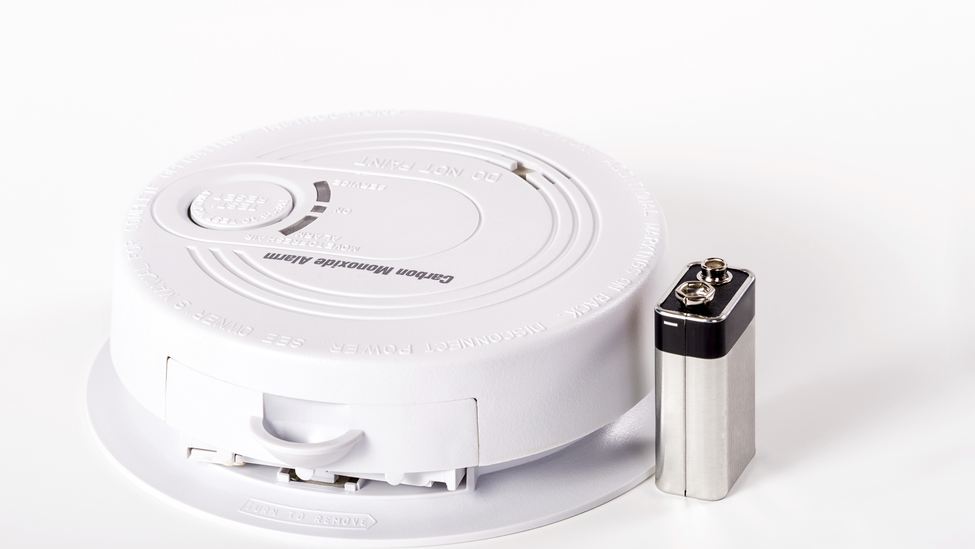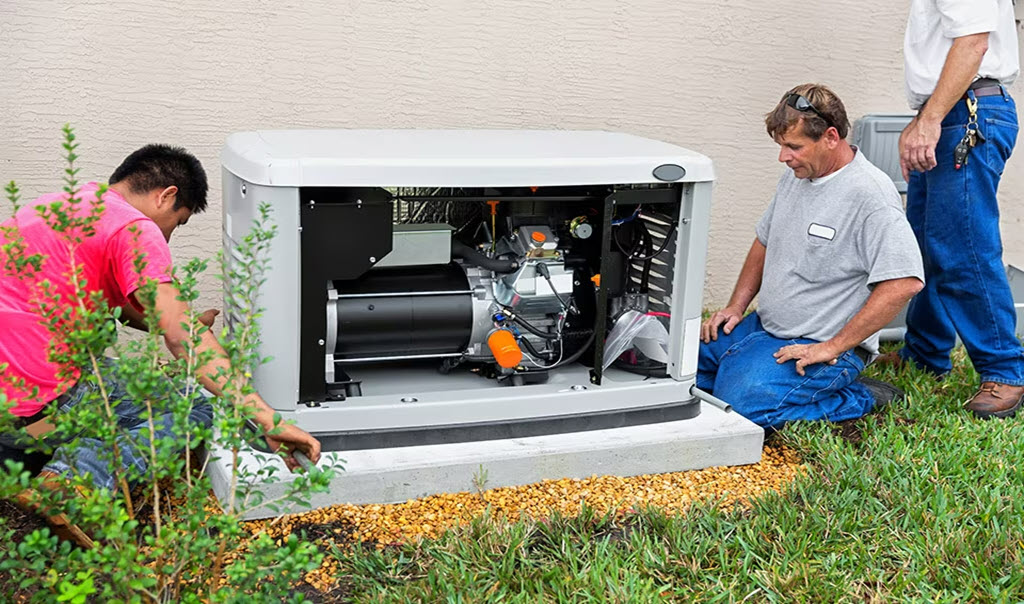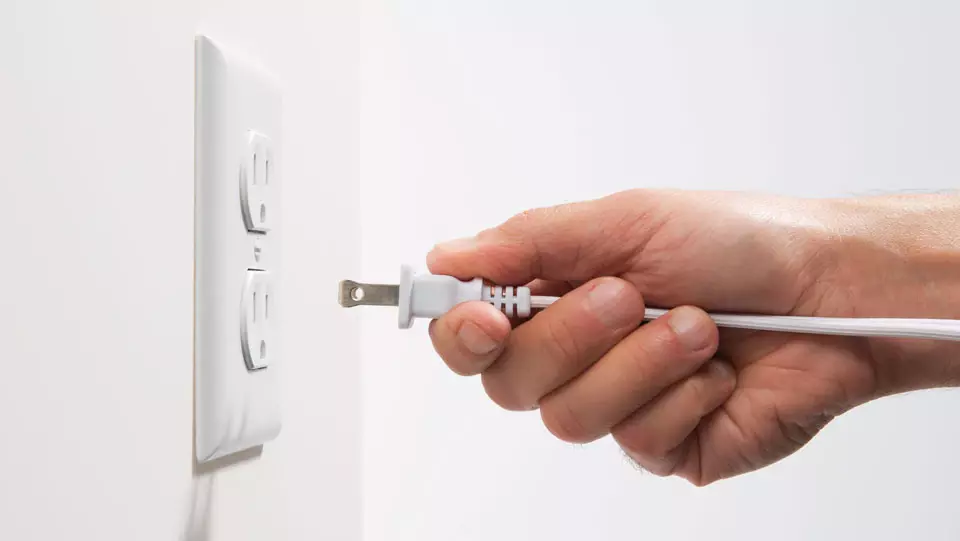Generator Safety

Storms or natural disasters can have the ability to knock your power out for an extended period of time. During an outage, portable generators can offer temporary power, but there are potential risks associated with the use of these generators. Generators can be dangerous and can lead to illness, injury and even death if used improperly.
(SPEECH)
[LIGHT MUSIC]
(DESCRIPTION)
Graphic of the white Travelers umbrella on a red background. Text, Generator Safety. #ThinkSafe
John Machnicki, Travelers Safety Expert.
(SPEECH)
JOHN MACHNICKI: While a generator can be a big help during a power outage, it can also be dangerous if you're not prepared.
(DESCRIPTION)
Animation depicts a generator a safe distance from a house.
(SPEECH)
Always operate your generator outside and away from your home.
(DESCRIPTION)
A fuel can inside a small structure. Liquid pours into the fuel can.
(SPEECH)
Make sure fuel is safely stored in a cool, dry place. And if it's going to sit unused, add a fuel stabilizer.
(DESCRIPTION)
A man greets an electrician at the front door.
(SPEECH)
Most importantly, consider speaking with a licensed electrician about how to install and use your generator before you need it. For more information on generator safety. Visit Travelers dot com slash Generator Safety.
(DESCRIPTION)
Text, See More Video Tips.
Share the Safety.
Facebook and Twitter logos. #ThinkSafe.
Get more information at Travelers dot com slash Generator Safety
The information in this video is intended for use as a guideline and is not intended as, nor does it constitute, legal, technical or professional advice. Travelers does not warrant that adherence to any recommendations, best practices, or guidelines will result in a particular outcome. In no event will Travelers or any of its subsidiaries or affiliates be liable to anyone who has access to or uses the information provided in the video.
When using a portable generator, it is important to take precautions for your safety and the safety of those in your home. Follow these guidelines for safe generator use:
- Read the manufacturer's safety and operating manual before using your generator.
- Never leave your generator running when you are away from your home or business.
- Check your generator regularly during operation.
- Use caution when touching your generator as many areas become hot and can burn you.
Be sure generator is connected correctly to avoid electrical hazards
Electricity supplied by a generator has the same hazards as your regular utility-supplied electricity. You can face additional risks if your generator bypasses safety devices, such as circuit breakers, that are built into your electrical systems. Travelers recommends contacting an electrical contractor or the generator manufacturer for the proper installation of your generator.
- Follow the manufacturer's instructions for properly grounding your generator to help avoid electrical shock.
- Be sure your hands are dry and that you are not standing in water before touching the generator.
- Never plug your generator into a wall outlet.
- Plug appliances directly into the generator using manufacturer-specified cords or three-pronged extension cords with the proper amperage rating for the intended use.
- Be aware that portable generators become hot while running and remain hot for a significant amount of time after they are shut down, creating a potential fire hazard.
(DESCRIPTION)
A plasma ball
(SPEECH)
[CHEERFUL MUSIC]
JIM: Remember when you were a kid and it was fun to generate static electricity? Well, it's not fun at all if the electricity is sparking from a portable generator that isn't set up properly. In fact, it could be deadly.
If you have a generator, make sure it's properly grounded. Your manufacturer's instructions will show you how, or an electrician can help. Plug in appliances using manufacturer's specified cords or three-pronged extension cords with the proper amperage rating. Don't use cords that are frayed or damaged. And never plug the generator into a wall outlet. That could electrocute someone working on the same power grid.
(DESCRIPTION)
He holds his hand up to the plasma ball
(SPEECH)
Remember, electricity is powerful and can be dangerous. I'm Jim, I'm a safety consultant at Travelers. To learn more about how to prepare and prevent accidents, go to travelers.com/generatorsafety.
(DESCRIPTION)
A red umbrella floats down, Travelers, It's better under the umbrella.
Never operate a generator indoors
Generators should not be operated indoors, in garages or basements, or near windows, vents or doors. Your generator should be kept well away from your home or business. A minimum distance of 25 feet is recommended; however, you should check your local ordinances and the manufacturer’s recommended practices for additional information. Be sure to take your neighbors/neighboring businesses' windows, vents and doors into account when positioning your generator. The exhaust from a generator can build up carbon monoxide (CO) – a colorless, odorless toxic gas – that can cause severe illness or even death.
- Maintain a clear space of three to four feet on all sides and above the generator to allow for proper ventilation.
- Help safeguard your home or business by installing CO alarms that are battery-operated or plug-in/hardwired with battery backup. Be sure to routinely test them, and replace batteries as recommended by the manufacturer.
(DESCRIPTION)
Travelers logo. A man sniffs the air as he stands beside a generator.
(SPEECH)
[MUSIC PLAYING]
JIM: I don't smell anything or see anything. I guess I don't have to worry about carbon monoxide gas.
[ALARM]
(DESCRIPTION)
His eyes widen. He looks up and down.
(SPEECH)
Whoa, you may not see or smell it, but carbon monoxide can build up in the air if a generator isn't ventilated properly. And that gas can kill you.
A portable generator should only be operated outside and 25 feet away from buildings, not in a garage or a basement, not near a window or a door. Don't put anything on or near the generator, unless it's designed for use with your particular generator.
(DESCRIPTION)
Text, 3 to 4 foot clearance.
(SPEECH)
You want air to flow freely, and you don't want the hot engine to ignite anything nearby.
(DESCRIPTION)
Have a C.O. alarm. The man holds up a white, round carbon monoxide detector.
(SPEECH)
A carbon monoxide detector can alert you to the deadly buildup of carbon-monoxide gas. Follow the manufacturer's instructions, do regular tests, and replace batteries as needed.
Finally, if anyone becomes lightheaded or dizzy, get them outside immediately and call 911. Carbon monoxide can be deadly. I'm Jim. I'm a safety consultant at Travelers. To learn more and how to prepare and prevent accidents, go to travelers.com/generatorsafety.
[MUSIC PLAYING]
(DESCRIPTION)
Text, Travelers. It's better under the umbrella. The information provided in this video is intended for use as a guideline and is not intended as, nor does it constitute, legal, technical, or professional advice. Travelers does not warrant that adherence to, or compliance with, any recommendations, best practices, or guidelines will result in a particular outcome. In no event will Travelers or any of its subsidiaries or affiliates be liable in tort or in contract to anyone who has access to or uses the information provided in the video. Travelers does not warrant that the information in this video constitutes a complete and finite list of each and every item or procedure related to the topics or issues referenced herein. Furthermore, federal, state, or local laws, regulations, standards, or codes may change from time to time and the reader should always refer to the most current requirements. This material does not amend, or otherwise affect, the provisions or coverages of any insurance policy or bond issued by Travelers, nor is it a representation that coverage does or does not exist for any particular claim or loss under any such policy or bond. Coverage depends on the facts and circumstances involved in the claim or loss, any any applicable law.
Refuel safely
You should always use caution when refueling your portable generator. There is a risk of fire or getting burned because of the nature of the task. Follow these safety tips to ensure you properly refuel your generator.
- Shut down your generator and allow it to cool completely before refueling. Gasoline, kerosene or other fuels used to run generators can ignite if spilled on hot engine parts.
- Do not try to refuel a generator while it is running.
- Make sure all generator fuels are stored and transported in approved containers.
- Fuels should not be stored in or near your house or business. They should be stored in a separate, well-ventilated area or in an approved flammable liquids storage cabinet.
- Do not smoke around fuel containers or while refueling your generator.
(DESCRIPTION)
Travelers logo. A man stands beside a portable generator and looks down at it.
(SPEECH)
SPEAKER: My portable generator just ran out of fuel.
(DESCRIPTION)
He shrugs.
(SPEECH)
Now what do I do?
(DESCRIPTION)
Switch on side of generator. Text, On off, Engine Switch.
(SPEECH)
Shut the generator down, and let it cool completely before refueling. Don't try to refuel it while it's running.
(DESCRIPTION)
A red fuel can beside him. Text on the can, Safety Can.
(SPEECH)
Use only approved containers for generator fuels, and don't store them in or near your house or business. Keep them in a separate well-ventilated area.
Of course, don't smoke around fuel.
(DESCRIPTION)
A no smoking icon.
(SPEECH)
Keep fuel away from the generator and any other heat or flame producing devices. And remember, never leave your generator running while you're out. And check it regularly while it's running.
(DESCRIPTION)
The portable generator is beside him again.
(SPEECH)
Follow the manufacturer's instructions, and you can be back in business quickly and safely. I'm Jim. I'm a Safety Consultant at Travelers. To learn more about how to prepare and prevent accidents, go to Travelers.com/GeneratorSafety.
[MUSIC PLAYING]
(DESCRIPTION)
Text, travelers.com/generatorSafety. Travelers Logo, Travelers, It's better under the umbrella.
The information provided in this video is intended for use as a guideline and is not intended as, nor does it constitute, legal, technical or professional advice. Travelers does not warrant that adherence to, or compliance with, any recommendations, best practices, or guidelines will result in a particular outcome. In no event will Travelers or any of its subsidiaries or affiliates be liable in tort or in contract to anyone who has access to or uses the information provided in the video. Travelers does not warrant that the information in this video constitutes a complete and finite list of each and every item or procedure related to the topics or issues referenced herein. Furthermore, federal, state or local laws, regulations, standards or codes may change from time to time and the reader should always refer to the most current requirements. This material does not amend, or otherwise affect, the provisions or coverages of any insurance policy or bond issued by Travelers, nor is it a representation that coverage does or does not exist for any particular claim or loss under any such policy or bond. Coverage depends on the facts and circumstances involved in the claim or loss, all applicable policy or bond provisions, and any applicable law.



